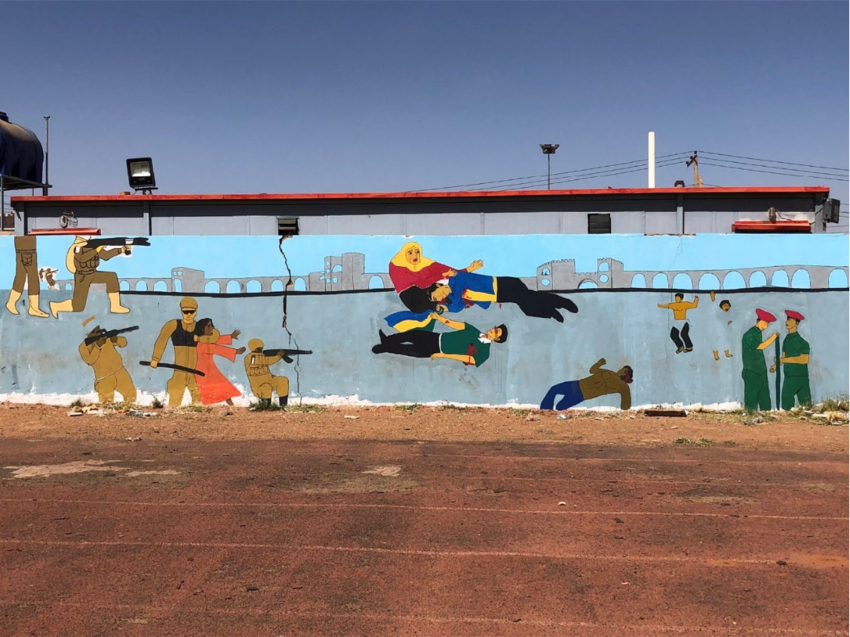03/06/2024
The following speech is by GPAC member Sara Abbas and was read out at a demonstration in Cologne, Germany on Staurday June 1st. Organised by Sudan AG Rhineland, the demonstration marked the 5th anniversary of the Qiyada Massacre in Khartoum on June 3rd, 2019, and the violent dispersal of the sit-in in front of the Military General Command.
_____________________________________________________________
Greetings comrades, siblings and allies,
I want to start by paying the deepest respect to the martyrs of Sudan’s three revolutions of 1964, 1985 and 2018.
I want to also pay my respect to the revolutionary women and girls of Sudan, who defied so much to organize in every place and space. I want to especially pay respect to the women and girls from South Sudan, Nuba Mountains, Blue Nile and Darfur, who were bombed out of their homes and their lands and who have been at the forefront of confronting state violence for decades.
I want to greet as well all those from Sudan at the demo, and to wish them strength in these painful times.
Greetings and love especially to our siblings from Palestine, Kurdistan, Tigray, Syria, Ukraine, Iran and everywhere else where people continue to stand up in the face of genocide and mass murder. Greetings to allies in Germany who see that what is happening to us in places like Sudan and Palestine is directly related to what is being done right here, in Europe. Europe continues to cut deals with mass murderers, to kill our siblings at its borders, to loot our resources, to blackmail us into cycles of escalating debt, and to tell billions of people across the world that all they can hope for, if they’re lucky, is to stay alive.
I won‘t speak much about June 3rd, 2019, except to say that it’s a day carved in blood forever in Sudanese history. A few weeks following that day, on June 30th, and despite the horror and internet blackout— millions came out on the streets across Sudan to say: there’s no turning back; the revolution continues. This took a stunning amount of local organizing and networking across locales, and would not have been possible without years of building structures capable of it. Sudan’s December Revolution is a testament to the power of sustained grassroots organizing. Its tools, tactics, vision, structures and evolution should be studied across movements, as should its lessons and failures.
The devastating war we see today in Sudan, which began in April of last year, is part of a long and bloody cycle of conflict. The extension of the war last year to other areas, including the capital city, Khartoum, is rapidly shrinking whatever safe spaces or means of livelihood were left. It is the workers, the poor, the small-scale farmers, the landless, the refugees, the displaced mothers and children living in shelters and camps, who are suffering the most. Sudan is in the grip of a catastrophic hunger crisis. In parts of the country and in some camps for the displaced, people are reduced to eating their seeds instead of planting them, to swallowing mud to feel full, to chewing toxic leaves from trees. The world as usual is desensitized to Black suffering, especially African suffering, and we see this too today in relation to what is happening in the D.R. Congo.
A few months before this war started, the neighborhood resistance committees had published what they call “the charter for the establishment of people power”. This came after months of local work across the country, from which a shared vision of how people can govern themselves crystallized. It is not a coincidence that this war started soon after. It is a counter-revolutionary war, meant to redirect energy from building alternative structures, to raw, basic, desperate survival.
At this moment in time, the counter-revolution is very much winning in Sudan, and the future of the revolutionary project is really unclear. The war is deepening, and the matrix of national and international interests fueling the fighting, is growing.
Defending the revolution right now means supporting the mutual aid initiatives. It means defending refugees’ right to cross borders without barriers or violence. It means pressuring for a ceasefire and an immediate end to the killing. It means rejecting false agreements based on secret negotiations in fancy hotels far away. It means defending revolutionaries and activists from repression by all sides. It means resisting the call to pit ethnicities against one another, or to pick a side to back. It means most of all to organize locally to raise the voices of those rejecting militarism, not just in Sudan but in Germany, in Palestine and elsewhere.
Since 2019, the German state has tried to bring so-called stability to Sudan by centering the military and promoting a civilian elite to share power with it. Germany is most interested in continuing to have a friendly face in power in Khartoum, one that can help it stop migration by any means. You should resist this and back the revolution’s demands of bottom up civilian rule, demilitarization and justice.
Before I end, I want to take a moment to remember your comrade and mine, Nuisha, who passed away suddenly here in Cologne in March. Nuisha, who fled Iran in 1980 following the Islamist counter-revolution there, was a committed anarchist, a courageous human being and steadfast ally to many struggles, including the Sudanese Revolution. May she rest in power and may we keep up her legacy.
Thank you.

